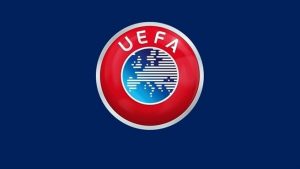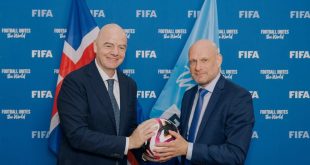 Nutrition in football is an important component in protecting the health of players and ensuring they can perform optimally in training and matches.
Nutrition in football is an important component in protecting the health of players and ensuring they can perform optimally in training and matches.
With this in mind, UEFA has published an Expert Group Statement on Nutrition for Elite Football which establishes best-practice nutrition recommendations for elite footballers and practitioners supporting them – including nutritionists, fitness coaches, scientists, doctors, physiotherapists and coaches.
The project concept initiated by Arsenal’s former head of nutrition, James Collins, and the club’s head of research & development, Dr Alan McCall saw nutrition experts join forces with the UEFA Medical Committee to draw up the project blueprint. A steering committee of international nutrition experts was established, including Prof. Ron Maughan (St Andrews University, Scotland), Prof. Mike Gleeson (Loughborough University, England) and Dr Johann Bilsborough (New England Patriots, NFL, United States).
This blueprint included contributions from an expert group of 31 of the world’s leading experts in nutrition and football both from the research field and elite sports teams and organisations such as, among others, FC Barcelona, AFC Ajax, the French Football Federation, the Mexican Football Association and the Australian Institute of Sport.
The experts represent nine countries spanning four continents. Given that football is truly a global game, a worldwide approach was needed to ensure that captured different cultures around the football world were involved.
“It was important for us that the expert group included those actually working on the ground with elite footballers on a day-to-day basis,” explains Alan McCall.
“Only with this combination of practical expertise and scientific knowledge are we able to get the right information that will make a difference to players’ health and performance,” he adds. “UEFA and the steering committee have succeeded in achieving this mix, and massive credit to all of those involved in getting the expert statement to where it is,” added James Collins.
Full list of contributors and affiliated authors
The main scientific article has been published in the British Journal of Sports Medicine. The scientific article is accompanied by an executive summary and additionally a series of practical application infographics (courtesy of AS Monaco sport scientist Dr Yann Le Meur; example above).
Major recommendations
The key recommendations from the statement take into account the diversity of the global footballing community, including both male and female players, outfield players and goalkeepers, as well as match officials.
Significant findings delivered in the report include:
• Matchday nutrition – How to best prepare players for optimal matchday performance – including carbohydrate (the main fuel for football performance) specific recommendations pre-match, during and in recovery from matches
• Training day nutrition – Recommendations on the key components of players’ training nutrition: macronutrients (carbohydrate, protein, fat), hydration, and micronutrients (vitamin D, iron calcium)
In addition, how nutrient requirements (specifically carbohydrate) for training should change each day based on training demands and individual training goals
• Staying healthy – The key elements to maintaining all body functions, and how inadequate intakes of several vitamins and minerals can impair players’ health
• Body composition – There is no single body mass or body fat percentage value that fits all players and the most accurate methods to monitor elite players
• Dietary supplements – Extreme caution must be taken due to the risk of a doping violation from the use of dietary supplements, as such nutrition strategies should be ‘food first’
• Globalisation – cultural diversity and dietary considerations – During Ramadan, players should be individually monitored with training loads adjusted accordingly, to reduce injury risk, and scheduled at the most appropriate time of day for nutritional support
• Injury rehabilitation – During the acute post-injury phase, care should be taken to maintain energy balance and protein intake and avoid micronutrient deficiencies to facilitate wound healing and tissue repair
• Junior players – Elite junior players should be periodically evaluated in relation to their individual energy, macronutrient, micronutrient and fluid demands according to their training/competition patterns and maturational status
Why this nutrition initiative matters
Tim Meyer, UEFA Medical Committee chairman
“UEFA’s Expert Group statement will help practitioners to make better decisions in their own practice about how to tailor nutritional interventions to individual players and training plans, taking account of possible health challenges and other requirements.”
James Collins and Alan McCall, project leaders
“As we approach a new season, the proceeds of this UEFA Expert Statement on Nutrition in Football will help to underpin the practical use of nutrition in clubs and federations around the world, as well as providing direction on future research in elite football nutrition.”
 Arunava about Football A look at football & the world through my eyes!
Arunava about Football A look at football & the world through my eyes!



